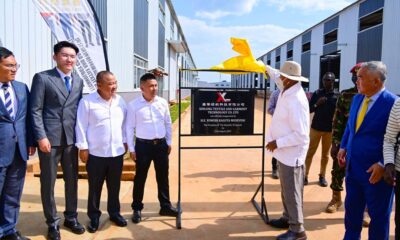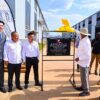Ramathan Ggoobi
Has independence stagnated Uganda?
Mr. President you were right, statistics show that ‘backward’ post-independence leaders have performed worse than colonialists!
Mr. President you were right, Mauritius and Zambia in that order. Had our incomes continued to grow at that rate, each Ugandan would now be earning about $13,100 (or about Shs. 34 million). Instead, we are still members of a club of 32 countries with the lowest income per capita on the planet.
At independence, prices for goods and services were stable. Inflation was averaging 5% and never exceeded a single digit. So the cost of living was very low. For example, although a university graduate earned a salary of Shs. 1,500 a month, he/she commanded a better living standard than his/her grandchild today. Then, the exchange rate was Shs.7 per U.S. dollar; meaning that a graduate earned about $214. If that amount is adjusted for inflation, it comes to about $1,500 in 2014 terms. That would mean that a fresh university graduate in 1962 earned about Shs. 3.9 million in 2014 money. What do fresh graduate earn today? Much less than that, often below a million shillings!
More importantly, because the prices of goods and services were low and stable, a Ugandan earning only Shs.1,500 lived a very comfortable life. For example, a parent was required to pay only Shs. 15 per term for his/her child to go to an elite urban primary school like Bat Valley Primary School, while top secondary schools, such as Old Kampala, charged only Shs. 20 per term. Today, a parent earning Shs. 1 million a month is required to pay Shs. 1.6 million a term for his/her six-year old baby to be allowed to draw cartoons at Kampala Parents Primary school.
We were projected to takeoff in 1990
A kilo of sugar cost 45 cents and did a litre of milk. A bottle of soda cost 65 cents, while a beer cost 1 shilling and 20 cents. As far as transport was concerned, the railway fare from Kampala to Mombasa was only Shs. 20, while that from Kampala to Arua was Shs. 10. A bus ticket within Kampala City cost a passenger between 25 and 30 cents. A bicycle cost Shs. 250, while a brand new car (Honda Civic) cost Shs. 30,000.
This implies that a fresh university graduate, with an income of only Shs. 1,500 a month lived a very comfortable life. This is the reason economists emphasise macroeconomic stability (particularly the stability of prices and exchange rates). A 1971 World Bank report considered Uganda among those African countries with a chance of achieving a GDP growth rate of 7% for the rest of the century, and thus had forecasted the country to take off by 1990.
All this prosperity was destroyed beginning in the 1972. By a stroke of pen, under decree 17/1972, Idi Amin revoked the residence permits of Asians of Indian, Pakistan and Bangladesh origin, many of whom were active in agribusiness, manufacturing, and commerce.
This reckless action, which understandably made Amin very popular among Ugandans, then and even today, put an end to Uganda’s post-independence economic prosperity. It set Uganda on a deterioration path. There were three main effects of the Asian expulsion: (i) skilled managers were replaced by largely unskilled people, often drawn from the military and with little education; (ii) the appropriation of Asian properties earned the country a long-lived reputation for lawlessness and property confiscation; and (iii) the manner in which former Asian businesses were acquired created insecurity of tenure, leading to asset stripping.
Deterioration of the economy forced Amin to introduce several economic distortions that further destroyed the hitherto promising economy. For example, shortages resulting from mismanagement of businesses, farms, and factories led to rising prices of goods and services. This prompted Amin to put price controls, which led to emergency of black markets (magendo) & hoarding of basic groceries and other essential commodities. He also imposed high import tariffs lead to smuggling. To finance fiscal deficits, Amin turned Bank of Uganda into a printing press of money, leading to high inflation (216% in 1979!). He also fixed exchange rates to as low as Shs. 7 per dollar, which led to shortage of foreign exchange.
Abnormal economic structure
No wonder, overall Uganda’s GDP fell by 40% between 1971 and 1980 under the weight of economic war and its subsequent distortions, political turmoil, social disorder, a highly over valued exchange rate, export taxation, and quantitative restrictions on imports. Not even Obote’s recovery programme of 1981-85 could bounce the economy back.
Mr. President, although your government has since 1987 implemented a number of successful reforms, leading to rapid recovery of the economy, Uganda still ranks in the bottom 11th percentile in the world on GDP per capita. The economy is structured in a very strange way. Our pattern of transformation or structural change does not fit the normal path for a developing economy. The economy has rapidly moved from agriculture directly to services, without first undergoing the mandatory industrial revolution. Its statistics look more like that of a developed country.
Like I have written in these pages before, this is the very reason our economy is not creating jobs. It is the reason the economy cannot generate enough tax revenue, forcing your government to tax agricultural inputs, salt, and the elderly. It’s the reason we’ve failed to redistribute incomes or sustain growth. The distorted structure of our economy is the reason the GDP has grown from $7 billion in 2001 to $25 billion today, yet incomes of Ugandans have been stagnant at less than $600 since 1970. We are kind of building a rich economy with poor people.
The reason for this paradox is the failure by your government to determine the appropriate roles of the State and the market. Prior to 1987 reforms, there was too much Government and too little market. Today, many of the distortions in our economy stem from too much market and too little government i.e. while government is doing some things that it shouldn’t, it is also not doing some things that it should.
Mr. President, it is now beyond debate that in pursuance of structural adjustments of late 1980s and the Washington Consensus of the early 1990s, we made some serious mistakes. We over liberalised, over privatized, over deregulated, and perhaps made our capitalism excessive. These are some of the things that are retarding our economy, making it unable to sustain growth and/or transform itself into the middle-income country we are dreaming about in the numerous development plans and visions we are penning every now and again.
Backward leaders? Perhaps!
When economists encourage countries to allow “free markets” to allocate resources, they do not mean that countries should build “free-for-all markets”. What we have in Uganda today are not free markets but free-for-all markets — unregulated and thus unguided markets that have been left on their own to decide what is wrong or unaccepted and what is right or accepted.
In successful economies and those that are fast transforming, government is guiding the markets tightly. We are not saying that government should make a comeback into business or by fixing prices, interest rates, and exchange rates. No. What we are saying is that the State should perform its duty of a referee in the game of economic activity. Liberalisation does not mean deregulation. Deregulation does not mean free-for-all.
Mr. President, I read somewhere in the papers that while officiating at a function in Kampala, you blamed African leaders for being backward because of their failure to invest in industries and services. That another sign of backwardness is because many people are still concentrated in agriculture and living in rural areas. Thank you very much Mr. President for seeing this. I also keep wondering how some people can call themselves revolutionary leaders, liberators, heroes etc. when they are leading people living in abject poverty, in darkness, and in substance agriculture!
Now these are Uganda’s statistics as far as the above indicators are concerned: At 80%, Uganda has the largest number of rural population in East Africa. We have an agricultural sector that employs the largest percentage of the population — 73%, while industry employs only 5% of Ugandans. Uganda’s electric power generating capacity is the lowest in East Africa, much lower than that of Kenya and Tanzania. Only 14% of households in Uganda use electricity.
The problem is much deeper Mr. President. You are leading a country where 10% of households do not use any toilet facility. 46% of them do not afford salt, 44% use only one room for sleeping, and 32% of houses are roofed with grass. All this information is contained in the latest National Household Survey carried out last year by the government statistics department, the Uganda Bureau of Statistics (UBOS).
Comments


























